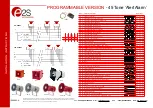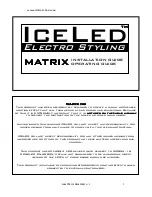
4
5
The alcohol concentration in the breath is related to that in the
blood, and because of this, an individual’s BAC can be determined
by measuring alcohol in the breath. The ratio of breath alcohol
to blood alcohol is generally estimated to be 2,100:1. Therefore,
2,100 milliliters (ml) of alveolar air will contain approximately
the same amount of alcohol as 1 ml of blood.
Alcohol is a Drug
Alcohol is the chemical (ethanol or ethyl alcohol) resulting from
the fermentation of grapes or grain. Alcohol is absorbed directly
into your bloodstream. From your bloodstream, the fluids in your
body tissues absorb the alcohol. Your brain is made up of a large
concentration of fluids and will absorb a large amount of any
alcohol you drink. Your liver eliminates the absorbed alcohol at its
own rate of time and nothing you eat or drink can speed up the
process. Your liver does this by oxidizing the alcohol (converting
it into water and carbon dioxide). Coffee, food or any other “cure”
will not sober you up. Only time will do that.
How does alcohol affect my body?
Alcohol is a depressant. It has a relaxing effect on the muscles in
your body. The muscles of your eyes relax and lose focus. Your
eyesight will become fuzzy and you may experience double vision.
Brain activity is slowed. Your judgment, reflexes, and coordination
are all negatively affected.
Some vision impairments that occur when you have been
drinking include:
• Narrowing of your field of vision
• Reduction in your depth perception
• Decreased ability to see in darkness
• Increased sensitivity to glare and a longer time
for your eyes to readjust from the glare
Some mental (brain) impairment can occur when you have
been drinking, including:
• Reduced awareness of danger
• Becoming overly confident and reckless
• Difficulty in making decisions
• Reduction in balance
• Slowed reflexes
• Impaired judgment
How does alcohol affect my driving?
We can’t emphasize enough how dangerous it is for you to
drink and drive. Your vision and your brain are the most important
factors in driving safely. If you jeopardize either by drinking, and then
you drive, you are likely to be involved in a serious or fatal collision.
From California Department of Motor Vehicles (http://www.dmv.ca.gov)




























